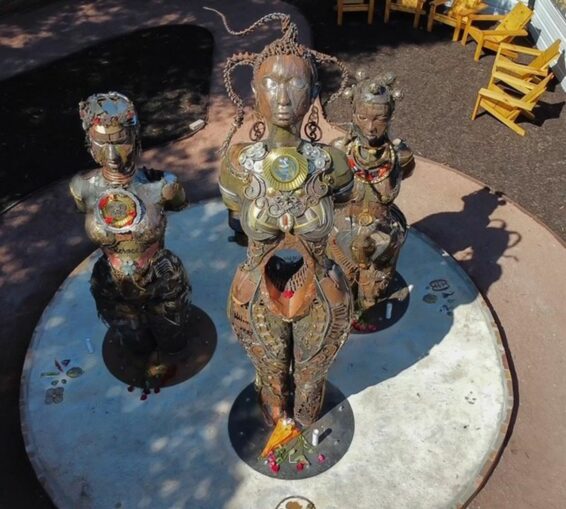‘Mothers of Gynecology’ monument exposes horrors of slavery
A righteous tidal wave of anger followed people seeing the nine-minutes-plus videotaped police lynching of George Floyd in Minneapolis late May 2020. Racist monuments glorifying the slave-owning Confederacy came tumbling down, especially in the Deep South. These acts to take down the statues were part of historic mass protests that swept the country during the summer of 2020 during the height of the COVID-19 pandemic.

The enslaved Black “Mothers of Gynecology” are now honored in this memorial in Montgomery, Alabama.
Two years earlier the monument paying homage to J. Marion Sims, once praised as the “father of modern gynecology,” was removed from Central Park in New York City, following many years of protest.
What led to the removal was a growing understanding and anger that Sims, a 19th century gynecologist in Montgomery, Alabama, used enslaved Black women as guinea pigs, experimenting on them with new medical techniques without using anesthesia or obtaining their consent. His techniques resulted in unspeakable torture.
Sims believed that Black women did not experience the same kind of pain as white human beings. Black people were nothing more than chattel to Sims and his ilk, who viewed them as less than human and actually treated them worse than animals. This was the prevailing view of enslavers in the South and even in some regions of the North.
Black women during this period were denied the right to control their own reproductive systems and destinies, starting when they were adolescents. This is horribly similar to the recent case of the 10-year-old girl from Ohio, raped twice, impregnated, and in order to receive an abortion, was forced to travel to Indiana, because of the fascistic anti-abortion law in Ohio. The doctor who performed that abortion is now being threatened with prosecution by the attorney general of Indiana, using a legal technicality to harass and punish her.
Treated as property, enslaved Black girls and women were systematically raped and sexually assaulted by white plantation owners and treated as “breeders” to produce more enslaved people. The enslaved grandmother of the great Mississippi activist, Fannie Lou Hamer, was forced to give birth 21 times as a result of this barbaric treatment.
Honoring those who resisted
In Montgomery where Sims first performed his horrific experiments, a stunning new monument was unveiled Sept. 24, 2021. “Mothers of Gynecology” includes figures representing Anarcha, Lucy and Betsey, three of the 11 enslaved women who were unwilling participants in Sims’ depraved procedures. Anarcha was reportedly pregnant at age 17 during this time.
The statues, located at the More Up Campus, are almost 15 feet high and were created by local Montgomery artist and activist Michelle Browder. The campus is dedicated to changing how history is remembered, “by finding creative ways to honor the voiceless, the minimized, the ignored.” (anarchalucybetsey.org)
Browder says of her motives, “The endeavor is to change the narrative as it relates to the history and how it’s portrayed, regarding Sims and the women [who] were used as experiments. They’re not mentioned in any of the iconography or the information, the markers.
“No one talks about these women and their sacrifices and the experimentations that they suffered,” Browder said. “And so I feel that if you’re going to tell the truth about this history, we need to tell it all.
“There’s more to this history than Dr. King and Rosa Parks, and the Confederacy.” (al.com, Sept. 27, 2021)
The monument is a gut-wrenching reminder of the strategic role that slavery played in establishing the U.S. as the most powerful imperialist country in the world, through the ongoing systematic and systemic repression of Black people as an oppressed nation.
As every Confederate monument comes tumbling down, new monuments should eventually take their place, honoring those who gave their life’s blood to resist and destroy the monstrous institution of white supremacy.
Besides the legendary heroes Harriet Tubman, Sojourner Truth, Nat Turner, Denmark Vesey, Gabriel Prosser, Osborne P. Anderson and John Brown, now in Montgomery the less-well-known heroes are honored — Lucy, Anarcha and Betsey.

